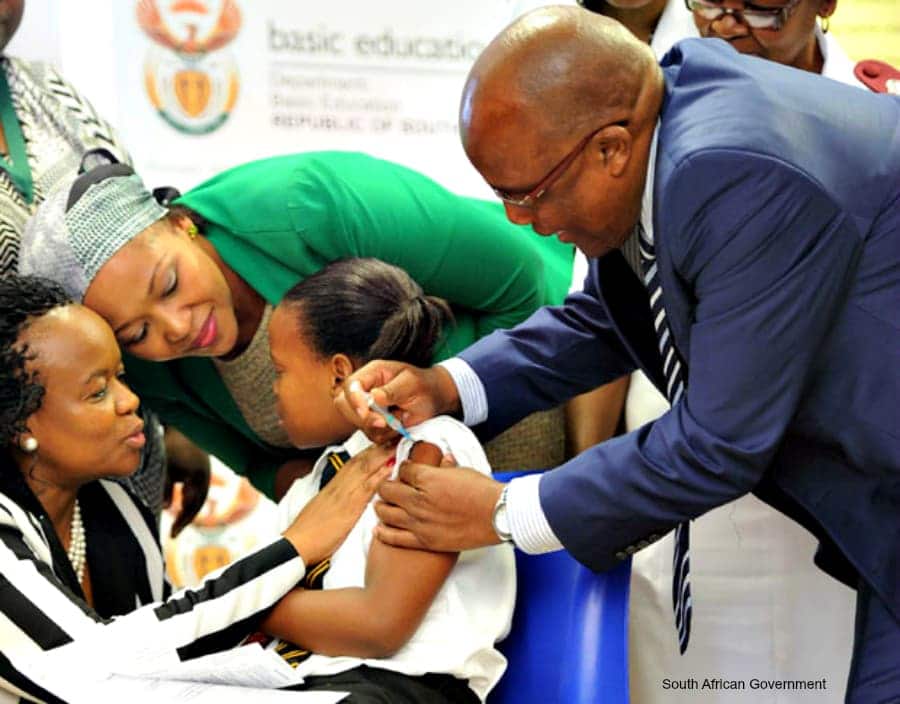KZN to go ahead with controversial circumcision clamp
Circumcised men are up to 60 percent less likely to get HIV than uncircumcised men, according to studies.
‘I don’t understand what the fuss is about the Tara Klamp,’ Dr Dhlomo said.
However, both the HIV Clinicians Society and the Treatment Action Campaign have called for the clamp to be ‘withdrawn from sale and distribution for adolescent and adult circumcision throughout sub-Saharan Africa until the device’s safety concerns are addressed’.
This week, 600 men are due to be circumcised with the TK, but the MEC said the emphasis would be on training doctors on the use of the clamp.
‘We are getting support from the Malaysians [who developed the TK] as the success of the procedure depends on proper training,’ said Dr Dhlomo. ‘The World Health Organisation will also be observing the process.’
Unlike the forceps method, which immediately removes the foreskin, the TK is a plastic clamp that is attached to a man’s penis and it falls off with his foreskin after about a week.
A small trial of young men in Orange Farm found that those circumcised with the TK were far more likely to report bleeding and swelling than those circumcised with forceps.
The trial involved 69 men, 35 of whom were circumcised with the TK and 34 with forceps, and was published in the SA Medical Journal in March 2009.
Some 37 percent of those circumcised with the TK reported ‘adverse effects’ including infection, delayed wound healing, swelling and problems with penis appearance while only 3.4 percent of those circumcised with forceps reported any problems.
Almost 100 men refused to be part of the study as they did not want to be circumcised with the clamp.
The TK trial was stopped early due to the unacceptably high rate of adverse events. The researchers concluded, ‘Given the high rates of adverse events in this study and the low number of available studies, we strongly caution against the use of the TK for young adults, and we recommend careful evaluation of the procedure when performed on children.’
When asked whether men would be prepared to walk around for a week with a plastic clamp on their penises, Dhlomo responded: ‘With the forceps method, a man has a lot of bandages that have to be changed. So with either method, a man still has to have something big hanging on his private parts.’
Dhlomo also said those conducting the trial at Orange Farm had ‘not had proper training’ in using the TK. However, this has been denied by the Orange Farm doctors.
‘Ample training and instruction was provided as well as correct sizes as instructed by the supplier,’ said Dr Dino Rech, head of the Centre of HIV Prevention Studies (CHAPS) based at Orange Farm.
Those promoting the TK say that it can be done faster and easier than the forceps method. However, CHAPS has performed 20,000 medical male circumcisions since 2008. Dr Rech says each of its three doctors is able to do 50 forceps circumcisions a day.
The TAC and the HIV Clinicians Society have pointed out that, aside from having more side effects, the TK is expensive and that those marketing it, evangelicals Tony Lawrence and Magda Van Der Walt, have an ‘inappropriate religious agenda’.
Author

Kerry Cullinan is the Managing Editor at Health-e News Service. Follow her on Twitter @kerrycullinan11
Republish this article
This work is licensed under a Creative Commons Attribution-NoDerivatives 4.0 International License.
Unless otherwise noted, you can republish our articles for free under a Creative Commons license. Here’s what you need to know:
You have to credit Health-e News. In the byline, we prefer “Author Name, Publication.” At the top of the text of your story, include a line that reads: “This story was originally published by Health-e News.” You must link the word “Health-e News” to the original URL of the story.
You must include all of the links from our story, including our newsletter sign up link.
If you use canonical metadata, please use the Health-e News URL. For more information about canonical metadata, click here.
You can’t edit our material, except to reflect relative changes in time, location and editorial style. (For example, “yesterday” can be changed to “last week”)
You have no rights to sell, license, syndicate, or otherwise represent yourself as the authorized owner of our material to any third parties. This means that you cannot actively publish or submit our work for syndication to third party platforms or apps like Apple News or Google News. Health-e News understands that publishers cannot fully control when certain third parties automatically summarise or crawl content from publishers’ own sites.
You can’t republish our material wholesale, or automatically; you need to select stories to be republished individually.
If you share republished stories on social media, we’d appreciate being tagged in your posts. You can find us on Twitter @HealthENews, Instagram @healthenews, and Facebook Health-e News Service.
You can grab HTML code for our stories easily. Click on the Creative Commons logo on our stories. You’ll find it with the other share buttons.
If you have any other questions, contact info@health-e.org.za.
KZN to go ahead with controversial circumcision clamp
by Kerry Cullinan, Health-e News
July 19, 2010



